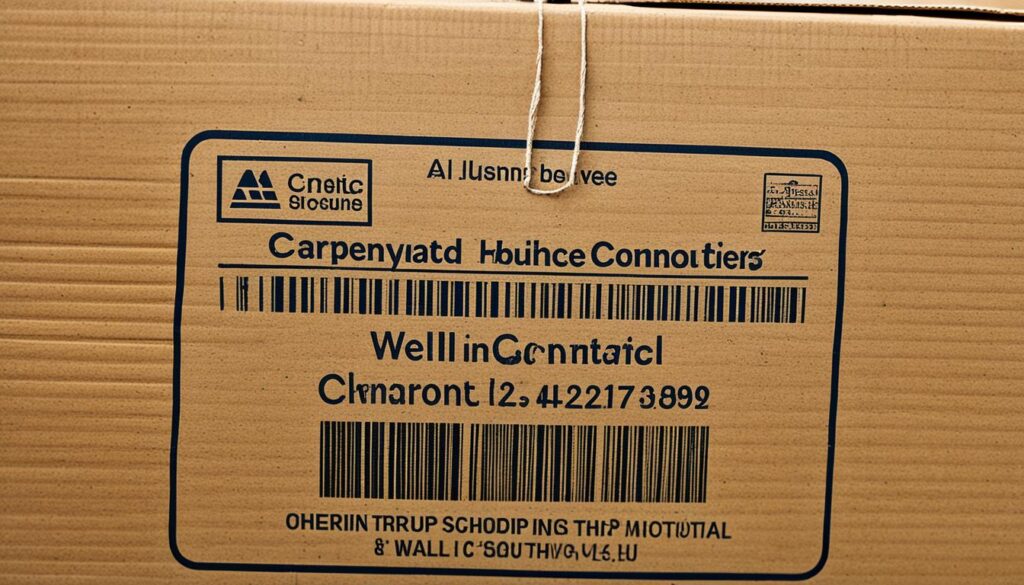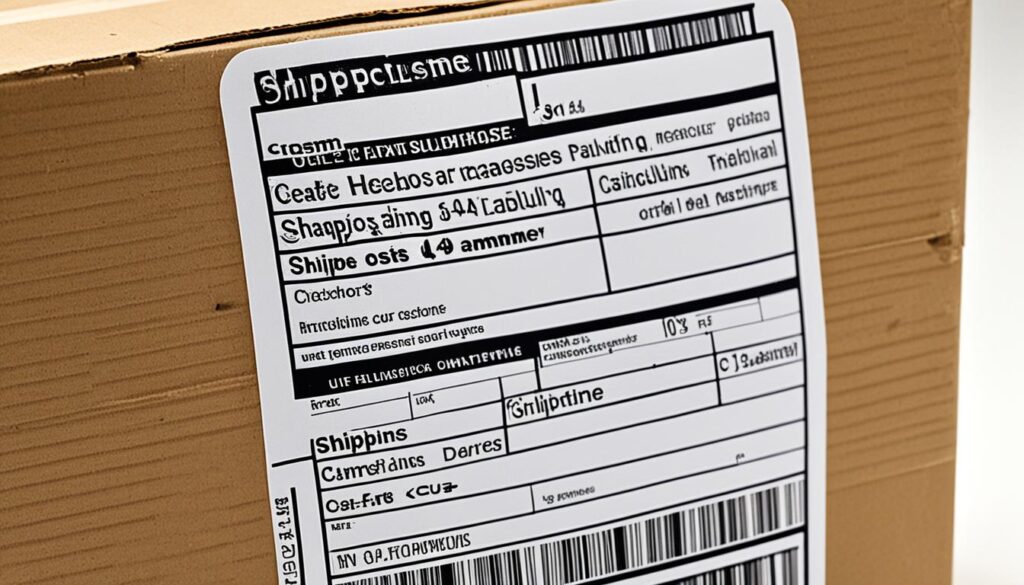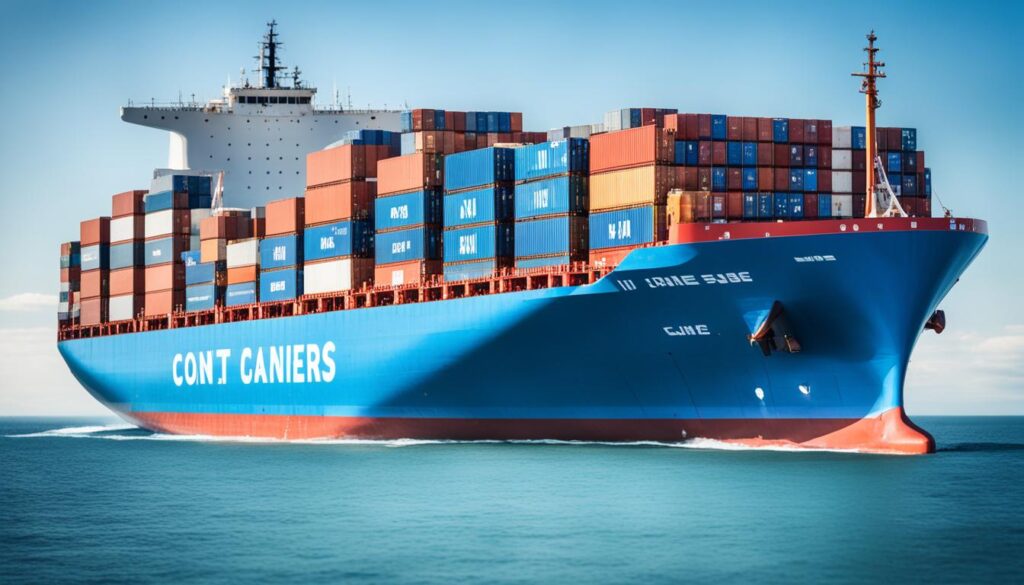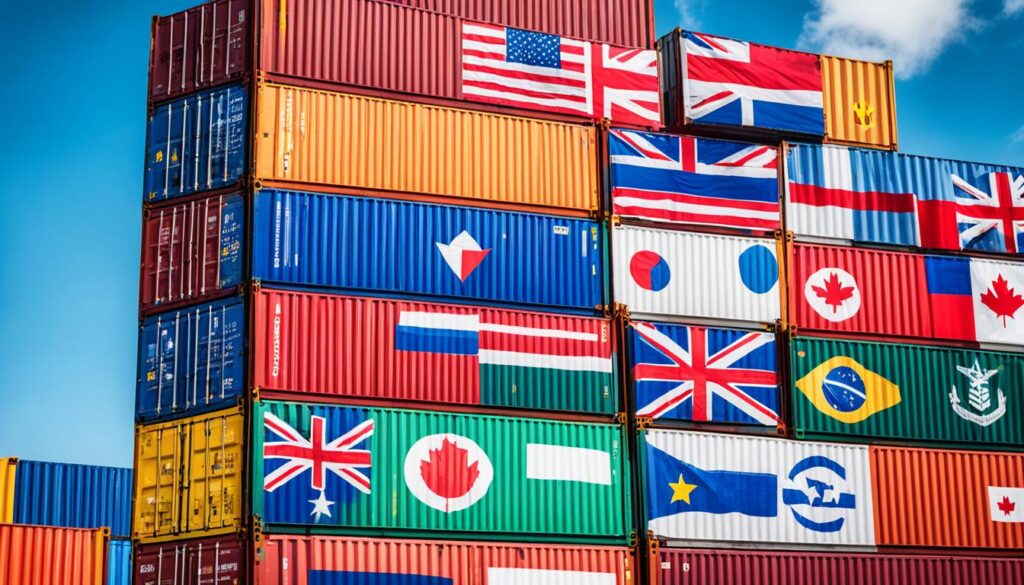Are you ready to take your business global? Or perhaps you’re planning an international move and need to ship your belongings overseas? Whatever the case may be, international shipping can be a daunting and complex process. But fear not! With the right approach and planning, you can ensure a smooth and stress-free experience.
From navigating customs regulations to choosing the right shipping method, there are many factors to consider when shipping items across borders. In this comprehensive guide, I will walk you through each step, providing valuable insights and expert tips to help you master the art of international shipping. So, are you ready to conquer the world and expand your horizons? Let’s dive in!
Key Takeaways:
- Research and choose a reliable shipping provider with a track record of successful international shipments.
- Understand the customs regulations and import restrictions of your destination country.
- Properly pack your items to prevent damage during transit.
- Ensure accurate labeling and complete documentation for smooth customs clearance.
- Choose the right shipping method that suits your needs and budget.
Researching and Choosing a Reliable Shipping Provider
When it comes to international shipping, selecting a reliable shipping provider is crucial for a smooth and hassle-free experience. The right shipping company can ensure that your packages reach their destination safely and on time. To make an informed decision, there are a few key factors to consider:
- Reputation and Track Record: Look for a reputable international shipping company with a proven track record of successful shipments. Check customer reviews and testimonials to gauge their reliability and customer service.
- Experience Handling International Shipments: An experienced shipping provider will have a deep understanding of the complexities involved in international shipping. They will be well-versed in customs regulations, documentation requirements, and shipping options.
- Transparent Pricing: Choose a shipping provider that offers transparent pricing. You should be able to easily understand and compare their rates, fees, and any additional charges.
By taking the time to research and choose a reliable shipping provider, you can ensure that your international shipments are in safe hands. For more information, consult the following table comparing reputable international shipping companies:
| Shipping Provider | Reputation | Experience | Transparent Pricing |
|---|---|---|---|
| Company A | ★★★★☆ | 10+ years | Yes |
| Company B | ★★★★★ | 15+ years | Yes |
| Company C | ★★★☆☆ | 5+ years | No |
Image:

Understanding Customs Regulations
Different countries have varying customs regulations and import restrictions. It is crucial to familiarize yourself with the customs requirements of the destination country to ensure a smooth and efficient international shipping process. Failure to comply with customs regulations can lead to delays, additional fees, and even confiscation of goods.
Customs regulations govern the import and export of goods, outlining the legal requirements and restrictions for specific items. These regulations aim to protect the country’s economy, environment, and public health, as well as maintain national security. Import restrictions can include restrictions on hazardous materials, controlled substances, agricultural products, firearms, and more.
To navigate customs regulations successfully, follow these essential steps:
- Research the customs regulations of the destination country: Visit the official website of the customs authority or consult with your shipping provider for up-to-date information on customs requirements. It is important to understand not only general regulations but also specific restrictions for your type of goods.
- Identify prohibited and restricted items: Ensure that your items are not on the prohibited or restricted list of the destination country. Prohibited items are strictly forbidden, while restricted items may require special permits, licenses, or additional documentation for import.
- Gather necessary documentation: Prepare all the required documents, including customs forms, invoices, and certificates of origin. Accurate and complete documentation is essential for smooth customs clearance.
- Provide detailed item descriptions: Describe each item in detail on the customs forms, including its value, quantity, weight, and purpose. Be specific and transparent to avoid any ambiguity or confusion.
- Comply with labeling and packaging requirements: Follow the destination country’s labeling and packaging guidelines to ensure that your goods are properly identified and protected during transit.
By understanding and adhering to customs regulations, you can minimize the risk of delays, penalties, and other complications that may arise during international shipping. Being proactive and well-prepared will contribute to a seamless customs clearance process.
“Understanding customs regulations is key to ensuring a hassle-free international shipping experience.”
| Country | Customs Regulations | Import Restrictions | Customs Requirements |
|---|---|---|---|
| United States | Various regulations based on specific goods and industries | Prohibited items: illegal drugs, counterfeit goods, hazardous materials | Customs forms, invoices, certificates of origin |
| United Kingdom | EU and UK regulations post-Brexit | Restricted items: firearms, endangered species, cultural artifacts | Customs declarations, commercial invoices |
| Australia | Quarantine laws for agricultural products | Prohibited items: firearms, narcotics, certain animal products | Import permits, shipping manifests |
Table: Customs Regulations, Import Restrictions, and Customs Requirements in Select Countries
In the United States, customs regulations are governed by U.S. Customs and Border Protection (CBP). The CBP website provides detailed information on specific regulations and requirements for different goods and industries.
Table: Customs Regulations, Import Restrictions, and Customs Requirements in Select Countries
Properly Packing Your Items
When it comes to international shipping, properly packing your items is crucial to ensure their safe arrival at the destination. Whether you’re shipping personal belongings or products for your business, taking the time to pack them securely can prevent damage and mishaps along the way. Here are some essential tips for proper packing:
1. Use Sturdy Boxes
Choose sturdy boxes that can withstand the rigors of transportation. Opt for corrugated cardboard boxes, as they provide excellent strength and durability. Avoid using damaged or weak boxes, as they might not withstand the handling during transit.
2. Provide Ample Padding
Protect your items by providing adequate padding inside the boxes. Use materials such as bubble wrap, packing peanuts, or foam to cushion fragile items. This extra layer of protection is essential to absorb any impact during handling and transportation.
3. Wrap and Cushion Fragile Items
If you’re shipping delicate or fragile items, taking extra precautions is vital. Wrap each item individually with bubble wrap, tissue paper, or packing paper. Fill any empty spaces with additional padding to prevent movement and minimize the risk of breakage.
4. Label Each Box Properly
Accurate labeling is essential for efficient handling and delivery. Clearly label each box with the contents, along with any necessary instructions or precautions. Include both the sender’s and recipient’s contact information to ensure proper identification and communication throughout the shipping process.
5. Consider Professional Packing Services
If you’re shipping valuable or delicate items, consider utilizing professional packing services. These services are provided by experienced professionals who have the knowledge and expertise to pack your items correctly, ensuring maximum protection. While it may entail an additional cost, the peace of mind and reduced risk of damage make it a worthy investment.
“Proper packing is the foundation for successful international shipping. It’s important to take the necessary precautions to secure your items and protect them during transit.”
By following these packing guidelines, you can minimize the risk of damage to your items and ensure a smooth international shipping experience. Taking the time to pack your items securely not only protects your belongings but also gives you peace of mind throughout the shipping process.
Next, we’ll explore the importance of accurate labeling and documentation in section 5. Click here to continue reading.
Labeling and Documentation
Accurate labeling and complete documentation are essential for a smooth international shipping process. Properly labeling your packages and ensuring all necessary documents are included will help avoid delays and potential issues during transit.
When shipping internationally, it is crucial to clearly mark each package with the recipient’s name, address, and contact information. This ensures that the package can be easily identified and delivered to the correct destination. Additionally, accurate labeling helps customs officials process the shipment efficiently.
Including shipping labels is another important aspect of accurate labeling. Shipping labels provide vital information, such as tracking numbers and shipping details, which help both the shipping provider and recipient track the package’s progress. These labels should be securely attached to the package using adhesive labels or plastic pouches.
Furthermore, complete documentation plays a significant role in international shipping. It is crucial to include all necessary invoices, customs forms, and any other required documentation for customs clearance. This documentation provides important details about the contents and value of the package.
Accurate labeling and complete documentation are crucial for a successful international shipment. They ensure that your package reaches its intended recipient without any issues or delays.
Packaging and Labeling Tips
To ensure accurate labeling and proper documentation, consider the following tips:
- Use sturdy boxes and proper padding to protect your items during transit.
- Place a duplicate shipping label inside the package in case the external label is damaged or removed.
- Include a detailed packing list that accurately describes the contents of the package.
- Make sure the package is sealed securely with adhesive tape.
- Double-check all contact information, including the recipient’s name, address, and contact number.
- Ensure that all invoices and customs forms are completed accurately and clearly.
- Consider using professional packing services for valuable or delicate items to ensure they are packed correctly.
By following these tips and guidelines, you can ensure accurate labeling and complete documentation, minimizing the risk of delays and ensuring a smooth international shipping experience.

| Key Point | Description |
|---|---|
| Accurate Labeling | Clearly mark packages with recipient’s details |
| Shipping Labels | Include tracking numbers and shipping details |
| Complete Documentation | Includes necessary invoices and customs forms |
Choosing the Right Shipping Method
When it comes to international shipping, selecting the right shipping method is crucial. Your choice will depend on your specific needs and budget. Let’s explore two popular options: air freight and sea freight, each with its own pros and cons.
Air Freight
For those who prioritize speed and time-sensitive shipments, air freight is an excellent choice. It offers fast transportation, and your goods can reach their destination in a matter of days. This is particularly beneficial for perishable goods or urgent shipments.
Pros of air freight:
- Rapid transit and shorter delivery times
- Greater accessibility to various destinations around the world
- Reduced risk of damage and theft due to shorter transit duration
Cons of air freight:
- Higher shipping costs compared to sea freight
- Limited capacity for larger or heavier shipments
- Potential restrictions on hazardous materials
Sea Freight
If cost-effectiveness is a priority and you have a larger volume of goods to ship, sea freight is a viable option. While it may take longer compared to air freight, sea freight offers significant savings, making it ideal for larger shipments or non-urgent deliveries.
Pros of sea freight:
- Lower shipping costs, especially for bulk shipments
- Ability to transport large quantities and oversized items
- Less environmental impact compared to air freight
Cons of sea freight:
- Longer transit times, which may not be suitable for time-sensitive shipments
- Potential delays due to weather conditions or port congestion
- Higher risk of damage or theft during longer transit durations
When deciding between air freight and sea freight, consider your timeline, budget, and the nature of your shipment. Consulting with a reputable shipping provider will help you make an informed decision based on your unique requirements.
Now that you have a better understanding of the pros and cons of both shipping methods, let’s move on to the next section to learn about tracking your shipment.

Tracking Your Shipment
When it comes to international shipping, staying informed about the whereabouts of your shipment is vital. That’s why it’s crucial to choose a shipping provider that offers reliable and convenient shipment tracking services. With shipment tracking, you can monitor the progress of your package, receive real-time updates on its location, and stay informed about the estimated delivery date.
Shipment tracking provides peace of mind by allowing you to keep tabs on your package throughout its journey. Whether it’s crossing borders or traveling across continents, you’ll have access to accurate and up-to-date information at your fingertips.
Real-time updates enable you to stay ahead of any potential delays or issues that may arise during transit. By knowing the current location of your shipment, you can plan accordingly and make informed decisions. Whether you’re eagerly anticipating a personal delivery or managing a business shipment, real-time updates ensure that you’re always in the loop.
Additionally, tracking your shipment allows you to provide your customers with accurate delivery information, ensuring transparency and improving customer satisfaction. The ability to offer real-time updates on the progress of their purchase can boost their confidence in your business and foster trust.
Furthermore, with shipment tracking, you can easily track multiple packages and shipments simultaneously, all from one convenient platform. This simplifies the process of managing your shipments, saving you time and effort.
Benefits of Shipment Tracking:
- Monitor the progress of your shipment
- Receive real-time updates on its location
- Stay informed about the estimated delivery date
- Plan your schedule accordingly
- Respond promptly to any delays or issues
- Provide accurate delivery information to customers
- Boost customer satisfaction and trust
- Simplify shipment management
By choosing a shipping provider that offers reliable shipment tracking services, you can ensure a smooth shipping experience and have peace of mind knowing that you’re always in control.
![]()
Being Prepared for Additional Costs
When shipping internationally, it’s important to be aware of potential additional costs that may arise. These can include customs duties, taxes, and import fees, which vary from country to country. To ensure a smooth delivery process and avoid surprises upon delivery, it’s crucial to budget for these expenses.
Consulting with your shipping provider or customs authorities is essential for obtaining accurate information on the specific costs involved. They can provide guidance on the customs duties, taxes, and import fees that apply to your shipment based on the destination country’s regulations. By proactively budgeting for these additional costs, you can better manage your finances and prevent any unforeseen financial burdens.
Proper budgeting is key to avoid unexpected costs when shipping internationally. By factoring in customs duties, taxes, and import fees into your overall shipping expenses, you can maintain financial control and ensure a seamless delivery process.
Being prepared for these additional costs not only helps you avoid financial setbacks but also ensures that your shipment can smoothly move through customs clearance. Failure to pay the necessary customs duties, taxes, and import fees could result in delays or even the return of your shipment to the sender. Therefore, taking the time to understand and plan for these costs is crucial for a successful international shipping experience.
Remember, customs duties, taxes, and import fees are determined by the destination country’s regulations and can vary depending on the nature and value of the goods being shipped. Staying informed and seeking guidance from your shipping provider or customs authorities will enable you to accurately calculate and allocate funds for these additional costs.
Shipping internationally involves more than just the transportation of goods; it requires a comprehensive understanding of customs regulations and associated costs. By being prepared and budgeting for customs duties, taxes, and import fees, you can navigate the complexities of international shipping with confidence and peace of mind.

Insurance for Valuable Items
When shipping valuable or irreplaceable items, it’s crucial to consider purchasing insurance to protect against potential loss or damage during transit. Whether you’re sending a priceless piece of artwork or a collection of antique jewelry, having insurance provides peace of mind and financial security in case the unexpected happens.
Why Insurance Matters
Shipping valuable items involves inherent risks, including theft, accidents, or mishandling during transportation. By investing in insurance, you can mitigate the potential financial loss associated with these unfortunate events. Insurance coverage ensures that you are financially protected and can recover the value of your items if they are lost, damaged, or stolen during transit.
Consulting with your shipping provider is essential to understand the insurance options available and the coverage they provide. They can guide you through the insurance process and help you choose the right policy based on the value and nature of your items. Make sure to inquire about the terms, conditions, and exceptions of the insurance policy to ensure they align with your specific needs.
Insurance Coverage
The insurance coverage for valuable items during transit typically includes:
- Loss or damage caused by accidents, theft, or acts of nature
- Protection against mishandling during shipping
- Full or partial reimbursement for the declared value of the item
- Flexible deductibles based on the policy terms
- Claims handling process for filing and resolving insurance claims
However, it’s important to note that insurance coverage can vary depending on the shipping provider and the specific policy you choose. Some policies may have limitations on certain types of high-value items or specific conditions that need to be met for coverage.
Choosing the Right Insurance Policy
When selecting an insurance policy for your valuable items, consider the following:
- Evaluate the total value of the items you want to insure to determine the appropriate coverage amount.
- Verify whether your existing insurance policies, such as homeowner’s or renter’s insurance, provide any coverage for shipping valuable items.
- Compare insurance options from different shipping providers to ensure you are getting the best value for your investment.
- Understand the policy limitations, exclusions, and terms before making a decision.
- Keep detailed records, including receipts, appraisals, or photographs of the items you are insuring, to support any potential insurance claims.
Remember, insurance for valuable items is a crucial aspect of international shipping. It provides an additional layer of protection and ensures that you can recover the value of your items in case of loss or damage during transit. Take the time to research and choose the right insurance policy that meets your specific needs to safeguard your valuable possessions.
| Insurance Provider | Coverage Options | Additional Benefits |
|---|---|---|
| ABC Insurance | Full coverage for loss and damage | 24/7 claims support |
| XYZ Insurance | Partial coverage based on declared value | Easy online claims process |
| DEF Insurance | Limited coverage for specific item categories | Specialized handling for fragile items |
Staying Informed and Communicating
When it comes to international shipping, effective communication is key. It is crucial to stay in contact with your shipping provider and the recipient of the shipment throughout the entire process. By keeping the lines of communication open, you can promptly address any concerns that may arise and ensure a smooth delivery.
Your shipping provider will be your main point of contact for any inquiries or updates regarding your shipment. They will provide you with important information such as tracking numbers, estimated delivery dates, and any potential issues that may affect the delivery. By staying in touch with your shipping provider, you can stay informed about the progress of your shipment and quickly resolve any issues that may arise.
Equally important is communicating with the recipient of the shipment. Provide them with the necessary tracking information and keep them informed about the expected delivery date. By involving the recipient in the shipping process, you can ensure that someone is available to receive the package and avoid any delays or missed deliveries.
In case any issues do arise during transit, effective communication can play a vital role in resolving them. If there are any concerns or problems with the shipment, prompt communication with both the shipping provider and the recipient can help expedite issue resolution. By working together and addressing the issue promptly, you can minimize any potential disruptions and ensure a positive shipping experience.
FAQ
How do I choose a reliable shipping provider?
What should I know about customs regulations?
How should I pack my items for international shipping?
What should I consider when labeling and documenting my shipment?
How do I choose the right shipping method?
How can I track my shipment?
What additional costs should I be aware of?
Should I purchase insurance for my valuable items?
How can I stay informed and communicate during the shipping process?
Source Links
- https://www.linkedin.com/pulse/ultimate-guide-hassle-free-international
- https://medium.com/@manoj.lama.925/mastering-the-art-of-packing-and-shipping-your-guide-to-hassle-free-deliveries-44a589760387
- https://medium.com/@transworld144/door-to-door-shipping-your-one-stop-guide-for-hassle-free-delivery-b2f63d35d697






